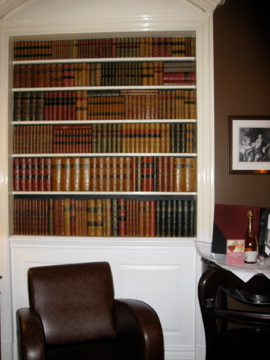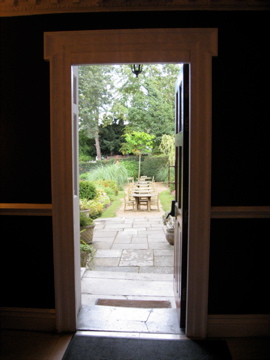Reframing it
“These days we create for ourselves an absurd panoply of ‘likes and dislikes’ and call it freedom. It’s a commodification of the notion of free will. Instead of behaving as free people and instead of feeling truly alive, we reduce existence to a list of products: ‘Likes: Red Bull, VW, The Simpsons, Apple Mac, Arcade Fire. Dislikes: Robinson’s Barley Water, Toyota, Ugly Betty, PCs, Metallica.’…. So says the Third Patriarch of Zen: ‘To set up what you like against what you dislike – This is the disease of the mind.'”
Tom Hodgkinson – The Idle Parent
“Who is happy? He who is satisfied with his lot.”
Pirkei Avot, 4:1
I had a couple of very interesting conversations recently, with Adrian Hon and Yoz Grahame about ‘preferences’ and the tyranny thereof. Now, before I start I should say: if you are the kind of person whose tendency is to squash down your own real preferences to the point that you can forget what they are and live only to make other people happy… the following thoughts probably do not apply to you. And if, like me, you have that tendency in some areas, or in relation to some people, it doesn’t apply in those areas.
Having said that. It has been occurring to me since I started this project that much of what makes us happy on a day-to-day basis is the way we frame the experiences we’re having. And that a lot of that framing has to do with ‘preferences’. And that those preferences are sometimes – not always – synthetic.
To explain: over the past 28 days I have been to some great places and some not-so-great ones. However, I have on some level enjoyed even the not-so-great experiences because I knew they were part of fulfilling my larger goal: this little project. Even at the crappy Warrington, or on my migraineous days, I’ve enjoyed thinking about how I’ll compose a blog post about them.
This is not how I’d usually operate. Usually I’d go “ugh, this is a horrible restaurant, I’m not enjoying this at all!” When I’m not embarking on a see-new-things project, I feel in a sense obliged to decide that I’m not enjoying a bad restaurant. Because I know the difference between a good restaurant and a lousy one, and part of the consequence of knowing that is to be dissatisfied with a bad restaurant.
And thinking about that, I suddenly thought: *the consequence of being more discerning is to have more occasions on which one is dissatisfied*. This was a bit startling for me. Usually I admire discernment. I think there’s something admirable about being the kind of person who can tell the difference between a £5 bottle of wine and a £50 bottle, and who prefers the £50 bottle. (I can’t tell the difference at all…) We do this in loads of areas I think: there’s a skill of ‘choosing good stuff’, and that’s supposed to be an admirable quality. But actually… it just gives you more occasions to feel annoyed that whatever you’re experiencing hasn’t come up to snuff!
Now, this thought comes with lots of caveats. One is: maybe *true* discernment is being able to pick up a £5 bottle of wine at some out-of-the-way place which tastes as good as the £50 bottles. So it’s not necessarily about money, although it’s still about ‘taking the trouble’. But even so… if one is as satisfied drinking the supermarket plonk as one would be with the taste of the more hard-to-get stuff, is that something to be ashamed of, or to rejoice in?
And clearly if one is a skilled professional, part of that skill is to know when to be dissatisfied with badly-made work, and when to feel that the work is well-made.
This thought applies really to cases where one’s sense of ‘discernment’ is causing needless unhappiness. I think it applies to me where I notice that *actually*, the experience I’m having/pub I’m sitting in/wine I’m drinking is perfectly pleasant, but because I know that ‘better’ ones (or ones I’ve been taught to consider ‘better’) are out there, I feel dissatisfied with it. Another way to say this is: maybe I actually don’t have as many preferences as I think I do. Maybe it is OK frequently not to have a particular preference.
This chain of thought arrived in my mind as I was sitting in the bar of the Hendon Hall Hotel today. It’s a nice little hotel, in a really weird location. This is the car park:

Not too promising…. But wait, here’s the hotel:

They are right next to each other, a curious juxtaposition:

I went inside, paid £3.50 for a cup of tea, and sat in the library, which I was willing to like until I noticed…

All those books? They’re fake.
Fake books are something that hurt me on several levels. I want to pick one off the shelf, but I can’t. I am annoyed that the work of writers is being taken advantage of by an establishment that wants an aura of literariness without actually choosing (and paying for) works by actual writers for their shelves. And there’s a third thing, an aesthetic sense, a sense of cheapness, of stupidity, of almost cargo-cultishness. Like, ‘if we put these things that look like books here, we will become more intellectual.” So I was suddenly extremely dissatisfied with my experience.
But honestly, who was my dissatisfaction hurting other than me? I moved room. I went to sit in a dining room with a view of their attractive garden. I spent two very pleasant hours writing and reading at a table in a silent room for only the price of a cup of tea. The fact that there were fake books next door didn’t stop me enjoying a real one.
My conclusion is that sometimes we can hold on too tightly to our aesthetic sensibilities. That sometimes it’s a good idea just to choose to be satisfied with where you are and what’s in front of you. Sometimes it’s all about how you frame it.





 Previous post
Previous post
